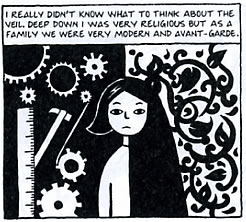“It was funny to see how Marx and God looked like each other.”
Marjane Satrapi’s Persepolis makes a nice introduction to the graphic novel autobiography for anyone who hasn’t read one before. Marjane’s memoir weaves the political turmoil of the Islamic Revolution with the everyday stuff of childhood experience. As the the repressive Islamic regime revokes liberal freedoms, Marjane’s folks (secular intellectuals, of course) smuggle Iron Maiden posters back from Turkey; young Marjane sneaks cigarettes and rock music to a backdrop of political assassinations and war with Iraq.

Persepolis succeeds by engaging the reader in a personal experience of revolution and cultural alienation. It works as a history lesson and as a coming of age story. Readers who try something different (maybe suspend some prejudices?) will be rewarded with an enriched perspective on a political/cultural upheaval still effecting global politics today.

You’re absolutely right to say that this works as both history lesson and coming of age story. Americans – especially since 1979 – been indoctrinated with the idea that [Iran = Bad]. The Carter and Reagan administrations’ propaganda campaigns worked so well that I grew up equating an entire nation of people with the tremendously frightening image of Ayatollah Khomenei. Reading “Persepolis,” though, lifts the veil – so to speak – on a lot of cultural misconceptions we may have. While it doesn’t exactly exonerate the Fundamentalists that took over the government, it reveals the complexities of the situation, both politically and culturally.
LikeLike
[…] a hardback edition of Persepolis 2. You may recall I wrote about Satrapi’s first book of Persepolis a few weeks ago. I’m happy to report that the books now exist in a special harmony, together […]
LikeLike
[…] this preview of the upcoming Persepolis movie; then check out my review of the book (thanks to Nick for the […]
LikeLike